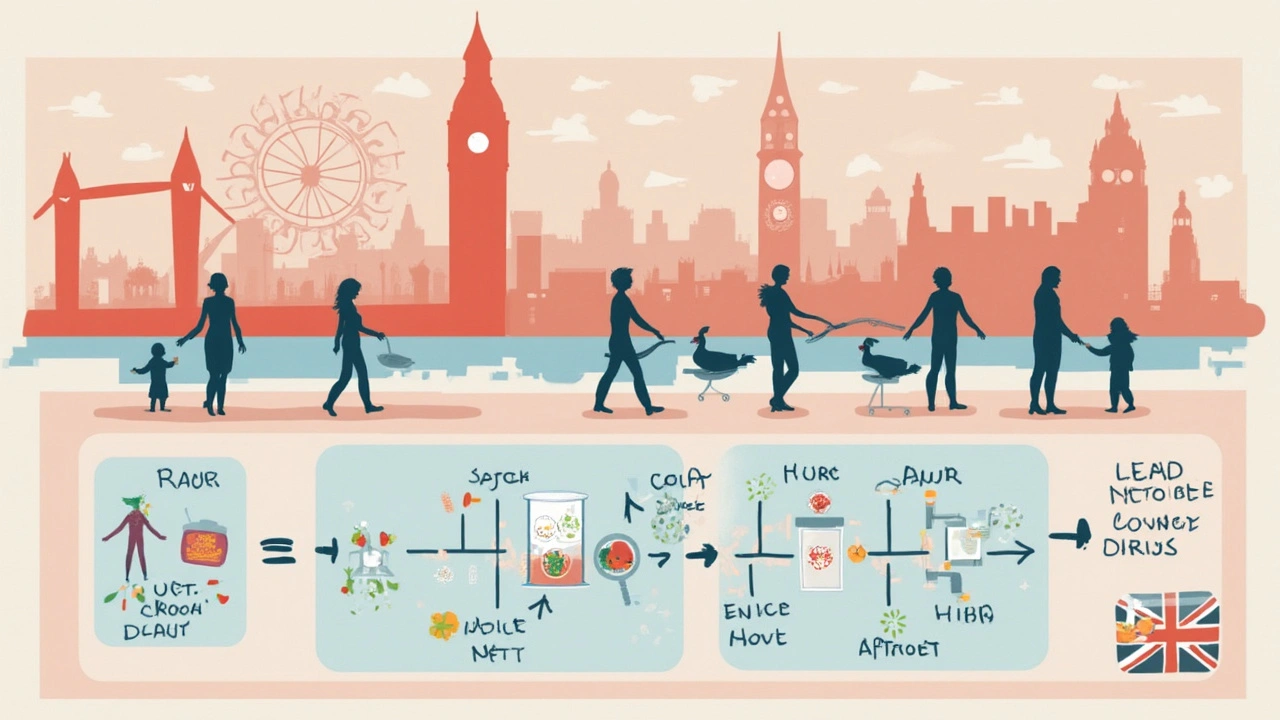Atenolol Interactions with Over-the-Counter Medications: Essential Guide for Safe Use

Picture this: you’ve just grabbed a bottle of cold medicine from the drugstore, tossed it in your cart with some ibuprofen, and started scrolling through social media while waiting in line. Harmless, right? Not if you’re taking atenolol. This popular beta blocker is one of the most prescribed heart medications in America, especially for people with high blood pressure, heart rhythm problems, or chest pain. But most folks don’t realize just how easily some everyday over-the-counter (OTC) meds can mess with the job atenolol has to do—sometimes making it less effective, sometimes pushing your heart into dangerous territory. It’s way more common than you think, and understanding what to look out for can keep you on the right side of healthy.
How Atenolol Works and Why Interactions Happen
If you’re wondering why atenolol cares about cold medicine or painkillers, you’re not alone. Atenolol belongs to a group of drugs called beta blockers, which work by slowing your heart rate and relaxing blood vessels. The point? Lower blood pressure, fewer irregular heartbeats, and less strain on your ticker. But here’s the catch: anything that messes with your nervous system, blood pressure, or fluid balance can change how atenolol works, sometimes without you noticing until there’s a problem.
OTC drugs aren’t just candy in a colorful box. A ton of them pack surprising power over your heart and blood pressure. Take decongestants, for example. Pseudoephedrine and phenylephrine (in almost every cold and allergy medication aisle in Austin) can jack up your heart rate and blood pressure—pretty much fighting against what atenolol is supposed to do. Naproxen and ibuprofen, two of the most popular painkillers nationwide, may make atenolol less effective and can even bump up your blood pressure. And don’t even get started on some herbal supplements, which often fly under the radar but can pack a wallop.
Check out this table to see some classic OTC meds and what they do when mixed with atenolol:
| OTC Medication | Common Usage | Effect on Atenolol |
|---|---|---|
| Pseudoephedrine | Decongestant (cold/flu) | Raises blood pressure, reduces atenolol effect |
| Ibuprofen | Pain relief | Can reduce blood pressure control |
| Naproxen | Pain/inflammation | May blunt beta blocker effect |
| Diphenhydramine | Allergy/sleep aid | May slow heart rate too much, especially with atenolol |
| St. John’s Wort | Herbal mood booster | May speed atenolol breakdown, reducing effectiveness |
Here’s one more twist: your own body plays a part. People break down drugs differently based on genetics, age, kidney function, and even what you had for breakfast. What’s safe for one person might not be for the next, and symptoms of a bad interaction don’t always show up right away. Some studies have pegged preventable drug interactions as a top reason for ER visits among blood pressure patients—most often because folks never suspected an issue in the first place.

Common OTC Drugs That Don’t Mix Well with Atenolol
Ever reached for DayQuil or Advil without a second thought? You’re definitely not alone. Tons of Texans take over-the-counter meds when they have a sore throat, a sinus headache, or a bout of allergies. But if atenolol is part of your daily memory stacker, it’s worth pausing before popping those pills. Let’s break down which ones can make life tricky.
First up: decongestants. These are found in cold and allergy formulas like Sudafed and even in multi-symptom syrups. Decongestants work by narrowing blood vessels to clear stuffed sinuses, but that also means hiking up your blood pressure—which is literally what atenolol is trying to stop. Clinical pharmacists warn these drugs can cancel out your beta blocker’s work, leaving you without the protection you thought you had. If you take atenolol and use decongestants, odds are your blood pressure will creep up and so might your heart rate.
Painkillers like ibuprofen (Motrin, Advil), naproxen (Aleve), and others in that nonsteroidal anti-inflammatory family (NSAIDs) aren’t much better. They act on your kidneys in a way that can lead to the body hanging onto more salt and water than is healthy—pushing your blood pressure up and possibly stressing your heart. Plus, long-term use piles on risks for kidney damage, especially if you’re already on blood pressure medication.
- Atenolol and NSAIDs are a risky combo for controlling blood pressure efficiently.
- Acetaminophen (Tylenol) is generally safer, but high doses over long stretches can still be tough on the liver—another organ you don’t want to gamble with if you’ve got underlying health issues.
The story doesn’t end there. Antacids containing sodium (like Alka-Seltzer) can throw off fluid balance, and antihistamines can sometimes exaggerate the effect of atenolol on your heart rate. Even some seemingly innocent natural supplements—looking at you, St. John’s Wort or ginseng—can either reduce the amount of atenolol in your system or change how your body responds to it. In one study conducted in 2023, over 18% of patients on beta blockers reported using some herbal supplement without telling their doctor, and half of those admitted they didn’t realize supplements could interact with their medications.
An unexpected culprit? Cough and cold products with caffeine, which can act as a mild stimulant. Even a small jolt can work against your medicine’s job to keep things steady. If you already use Celsius or energy drinks, double check the ingredients before adding something else to the mix.
So what symptoms should put you on alert?
- New or worsening headaches
- Racing or pounding heart
- Trouble catching your breath after light activity
- Unexplained swelling, especially in the legs
- Dizzy spells or fainting
Some of these sounds like “normal” side effects from a sinus infection or allergies, but if you notice them within a day or two of starting a new OTC med, it’s time to talk to your healthcare provider or pharmacist. Remember, ER doctors are trained to ask about every medicine and supplement you take for a reason—they know what a sneaky interaction looks like.

Smart Strategies to Avoid Dangerous Mix-Ups
So how do you avoid a medication disaster while still getting relief from minor aches, sniffles, or sleepless nights? Start by treating your pharmacist like a teammate. Pharmacies in Austin and everywhere else will answer questions, even in the drive-thru lane. Bring a list of everything you take (including herbs and vitamins) when shopping for new meds, and ask before you grab something off the shelf.
If you have a smartphone, there are plenty of apps—GoodRx, Medisafe, even some main pharmacy chains’ in-house tools—that will flag possible drug interactions for you. Just plug in atenolol as one of your prescriptions, and check every new OTC or supplement before you buy it. This comes in really handy for households with more than one person on multiple meds, or for those impulse purchases late at night when the pharmacist isn’t available.
Here are a few go-to rules that anyone on atenolol should stick to:
- Pick cold and allergy products labeled “for high blood pressure” or “decongestant-free”—these skip the problem ingredients and are widely available.
- Stick to plain acetaminophen (Tylenol) for pain relief when possible. Double-check dose instructions to stay kind to your liver.
- Always read the ‘active ingredients’ section on the box—quite a few combo products sneak in unwanted extras.
- Watch for double-doses if you use multi-symptom meds; it’s shockingly common for people to take a separate ibuprofen pill alongside a cold and flu syrup that already contains some.
- Don’t add herbal supplements to your daily routine without checking with your healthcare provider. Just because it comes from a plant doesn’t mean your heart is automatically safe.
If you ever start a new medication (prescription or OTC) and begin to feel off—heart pounding, extra tired, swelling, or just ‘not right’ — trust your gut. The scariest thing about drug interactions is that the first warning sign can sometimes be serious. But the good news is, just a bit of extra attention makes them almost always preventable.
Want a real-world pro tip? If your doctor prescribes a new medicine, don’t leave the office or clinic until you know whether it’s safe with atenolol. Just ask: “Does this interact with my beta blocker?” Doesn’t matter if it’s an urgent care visit for a sinus infection or a routine refill at your local Austin pharmacy—your heart and your peace of mind both deserve a little extra backup.

Akshay Pure
July 18, 2025 AT 01:13Honestly, I find these kinds of guides to be essential but often underappreciated. People just pop OTC meds without considering their impacts on prescribed drugs like atenolol. It's almost as if self-medication is a sport nowadays, and nobody bothers to understand the pharmacodynamics involved.
This article does a good job at emphasizing the biochemical interplay when beta blockers meet other substances. Most obviously, NSAIDs are a nightmare for blood pressure control, but it’s the subtler interactions, like with decongestants and antacids, that can sneak by unnoticed.
Frankly, I’d advise anybody on atenolol to develop a habit of consulting healthcare professionals before grabbing anything off the shelf, rather than relying on ambiguous labels or internet forums.
Pharmacy aisles aren’t just aisles; they’re potential mines of interaction risks requiring a discerning, informed approach.
In summary: The modern patient must elevate their understanding or risk undermining the very treatments keeping them alive.
Doug Farley
July 18, 2025 AT 09:50Oh great, another recharge the obvious campaign! Of course NSAIDs aren’t a great combo with atenolol, that’s basic medicine 101. But what really cracks me up is how every 'essential guide' believes you're too clueless to handle something as simple as Tylenol.
Like, do people really think shooting down a couple of ibuprofen tabs is gonna give them a heart attack if they’re on atenolol? I mean, come on—the fearmongering in these posts is just theatrical.
Still, for the folks who actually need this info, I suppose it’s a decent primer. But hey, if you’re dumb enough to mix medications irresponsibly, no drug guide is gonna save you.
But seriously, can we get an article explaining why people think Google MDs know more than actual doctors? That’s the real epidemic here.
Jeremy Olson
July 18, 2025 AT 11:13As someone who works in healthcare, I appreciate the effort put into educating patients on these interactions. The nuances of how atenolol interacts with common OTC meds aren't always clear to patients, and articles like this make a difference.
It’s important to recognize that atenolol’s effectiveness can be compromised by drugs like NSAIDs due to their influence on blood pressure regulation. Also, decongestants containing pseudoephedrine can raise blood pressure, counteracting atenolol.
Patients should always consult their healthcare providers before combining OTC medications, even for seemingly benign drugs. Empowerment comes from understanding, not fear.
I'd love to see more widespread patient education campaigns to prevent inadvertent adverse effects from polypharmacy.
Pam Mickelson
July 19, 2025 AT 03:53This article breaks down a pretty complex topic into bite-sized, relatable advice, which is exactly what the average atenolol user needs. I’ve seen so many friends confuse OTC painkillers or cold remedies with instantly safe options, not realizing how these can undo the medication’s work.
What really stands out is the simple explanations of how the drugs interact inside the body. It’s not just some rule to follow blindly, but understanding why makes it stick better.
My only suggestion would be to add a quick reference chart for common OTC meds to help people shop wisely.
But overall, it’s a confident, reassuring tone that empowers people to stay safe without panic—which is tough to strike.
Joe V
July 19, 2025 AT 20:33I gotta say, despite the solid info, the approach pretty much screams "don’t even try to think for yourself, just follow the script." Look, folks, atenolol and OTC med interactions are serious, sure, but we also have to acknowledge that patients aren’t idiots.
Dispensing info is one thing, but treating people like children who can’t read labels or ask their doc is patronizing. This guide borders on coddling rather than educating.
That said, it thankfully avoids oversimplification that can lead to misinformation, so points there.
I’d push for more nuanced advice on when self-care is appropriate versus when to seek professional help, instead of just blanket warnings.
Scott Davis
July 23, 2025 AT 21:46I think this is a useful resource for anyone on atenolol but it’s basically reinforcing the same warnings you hear in every doctor’s office.
You really just need to be mindful when picking OTC meds and talk to your pharmacist or doctor when in doubt. Most interactions aren’t immediately dangerous but can lower how well your beta blocker works or cause side effects.
It helps to keep a list of what you take regularly so you don’t accidentally mix things up at the pharmacy.
It's great to see an article encouraging people to take control responsibly, rather than just avoid meds altogether.
Calvin Smith
July 29, 2025 AT 16:40Wow, what a snooze fest, am I right? But seriously, I get that atenolol is no joke and mixing it with the wrong OTC can mess you up real quick, but does it have to read like a pharmaceutical textbook?
Let’s spice it up with some real talk: If you’re taking atenolol, be the boss of your drug game. Check labels, question the pharmacy staff, and don’t buy into the illusion that OTC means zero risk.
If pseudoephedrine decongestants can raise your BP, why would anyone in their right mind just grab any cold medicine? Get savvy or get lucky, people.
Bottom line: this guide is a good starting point but let’s not treat readers like mushrooms.
Brenda Hampton
August 2, 2025 AT 17:53This article really sparks important questions for me. How often do healthcare providers actively educate patients about such interactions? It seems so common for people just to be handed atenolol scripts with minimal counseling on OTC caution.
I wonder if some adverse reactions are misattributed simply because patients don’t realize the OTC meds are working against their beta blockers.
The advice to pay attention to decongestants and pain relievers resonates because those are go-to for many. I’m curious: has anyone experienced side effects from OTC meds while on atenolol, and how was it handled?
More discussion on patient experiences could make these guides even more practical and relatable.
Lara A.
August 3, 2025 AT 07:46Seriously, people, this is exactly why the pharmaceutical industry is hiding THE TRUTH about the "safe" OTC drugs we ALL rely on!!! Every combination is a ticking time bomb, and no one warns you enough!!! Have you seen how they conveniently ignore the MULTIPLE warnings about pseudoephedrine and NSAIDs causing hidden mayhem with atenolol?!?
Wake up, people!!! The so-called 'essential guides' just gloss over the real danger and keep you dumbed down! Someone needs to blow the whistle on this madness before more people get hurt due to these sneaky mix-ups!
Stop trusting the sugar-coated info and do your own digging!!!
Ashishkumar Jain
August 9, 2025 AT 02:40That's a really good and thorough guide for anyone in India too, where self-medication is way too common. Many folks don't realize how much OTC drugs interact with meds like atenolol – it’s like playing with fire without knowing it.
We definitely need more such awareness campaigns at community health centers here. Simple tips like reading labels carefully or asking pharmacists can save a lot of trouble.
I appreciate the article’s focus on empowering patients. Sometimes, little knowledge gaps cause big health risks.
Personally, I’ve seen some elders in my family get confused mixing vitamins and OTC painkillers with atenolol, so this kind of information is a real eye-opener.
Richa Ajrekar
August 13, 2025 AT 17:46While the article presents info decently, I have to say the language could be more precise and less vague. OTC meds must NEVER be taken lightly, especially alongside something as critical as atenolol.
More consumer education is crucial, but lazy critique and omission of known interaction severity doesn't help either. The warnings about NSAIDs, decongestants, and other common OTCs require stricter attention.
And let's be honest, many people here don't properly read labels or follow dosage instructions, so straightforward, no-nonsense communication matters.
Overall useful content but could benefit hugely from a sharper, more direct editorial approach.